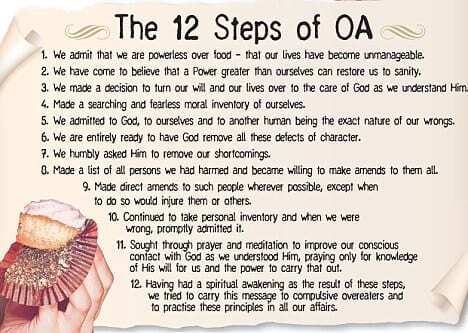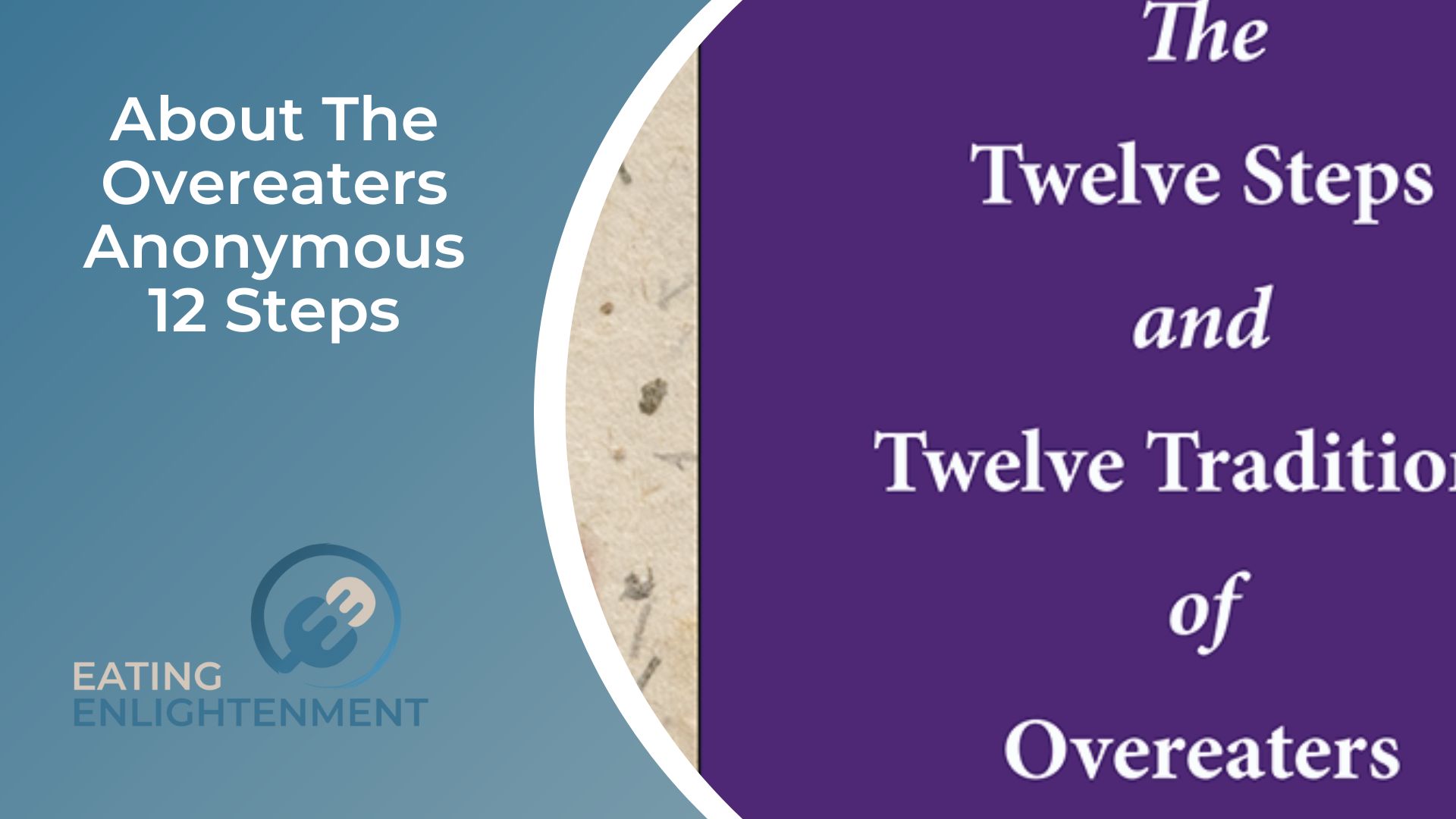If you’re struggling with compulsive overeating, you’re not alone. Overeaters Anonymous (OA) is a 12-step program designed to help people who are struggling with food addiction.
The program is based on the Alcoholics Anonymous model and is adapted to fit the unique needs of those struggling with compulsive overeating.
Keep reading to learn more about the 12 steps of Overeaters Anonymous.
Please note that there are many different OA groups and some refer to the steps as the twelve traditions of overeaters anonymous.
Either name you prefer the steps and twelve traditions for many people are their first gateway into learning about healing their relationship to food!
Is there a 12 step program for overeaters?
While overeating can take many forms, and certain behaviors may be beyond external control, there is hope for compulsive overeaters wishing to overcome compulsive food consumption and start anew on their journey to health.
The OA the 12-Step program – much like the 12-Step program developed by Alcoholics Anonymous – involves spiritual, emotional, physical and nutritional recoveries that are achieved through various steps designed to replace bad habits with healthier ones.
Steps range from admitting one’s self-destructive habits and making amends for past wrongs to embracing healthy living as a way of life.
Additionally, participants also attend counseling sessions and support groups. With dedication and determination, documented results of success within this program have been plentiful since its conception in 1960.
Regardless of what form your compulsive eating habits have taken, the 12-Step program offers valuable guidance towards understanding triggers while teaching effective coping skills in order to live a more balanced life.
Hopefully by finding solace in this approach you too can learn how to better manage these cravings while creating lasting positive change in your life today.
Check out this science article, “Overeaters Anonymous: An Overlooked Intervention for Binge Eating Disorder“.
You may also want to read “Overeating Anonymous Pros and Cons“.
The 12 Steps of Overeaters Anonymous

- We admitted we were powerless over our eating disorder—that our lives had become unmanageable.
- We came to believe that a power greater than ourselves could restore us to sanity.
- We made a decision to turn our will and our lives over to the care of God as we understood Him.
- We made a searching and fearless moral inventory of ourselves.
- We admitted to God, to ourselves, and to another human being the exact nature of our wrongs.
- We were entirely ready to have God remove all these defects of character.
- We humbly asked Him to remove our shortcomings.
- We made a list of all persons we had harmed, and became willing to make amends to them all.
- We made direct amends to such people wherever possible, except when to do so would injure them or others.
- We continued to take personal inventory and when we were wrong promptly admitted it.
- We sought through prayer and meditation to improve our conscious contact with God as we understood Him, praying only for knowledge of His will for us and the power to carry that out.
- Having had a spiritual awakening as the result of these steps, we tried to carry this message to other overeaters, and to practice these principles in all our affairs.”
What does the first step in Overeaters Anonymous mean?
As anyone who has faced an eating disorder can attest, it is not something that you can control simply through sheer willpower. It takes a powerful commitment and dedication to truly overcome it. This is where Overeaters Anonymous comes in.
A worldwide fellowship for those struggling with compulsive overeating who wish to maintain personal anonymity, the group centers around the idea of a 12-step program to achieve spiritual and emotional healing from their disorder.
The first step of this program is an important one – admitting that you are powerless over your eating disorder, and acknowledging that your life has become unmanageable due to it.
This moment of personal reflection serves as a revealing reminder that you need help in order to free yourself from its grasp and embark on the journey towards recovery. Whilst it’s a difficult realization for many, beginning this first step helps pave the way for an individual’s ability to take back control of their life and get the support they need in order to heal ultimately heal fully. With such realizations comes the promise of hope, beginning with step one – admitting powerlessness and unmanageability.
Each successful step leads them closer towards complete freedom from their compulsion of overeating. While challenging, these steps are possible through understanding and care from Overeaters Anonymous members and leaders alike that cannot be found elsewhere; these people make the difference when providing wellbeing and strength for those ready for change.
By taking that initial leap necessary for starting any journey – admitting powerlessness – those suffering from overeating issues are able take brave steps towards rebuilding their lives with Overeaters Anonymous as their guide as they reclaim independence after addiction. Realizing powerlessness isn’t always easy but it paves the path towards self-liberation in recovery.
What is the OA Diet Plan?
If you’ve been hearing a lot about the OA Diet Plan recently, you’re not alone. The OA Diet Plan is a weight-loss program developed by a group of medical professionals specializing in nutrition and bariatric medicine. Unlike other diets, it doesn’t require calorie restriction or any specific foods.
Instead, the plan focuses on encouraging people to develop healthier lifestyle habits that encourage balanced eating and mindful consumption of food. This includes learning how to recognize true hunger versus emotional consumption, controlling portion sizes, planning meals ahead of time, and paying attention to individual cues about satisfaction and fullness.
Furthermore, participants are encouraged to be well-informed about the health benefits and consequences of different foods in order to make healthier choices. Ultimately, the goal of this plan is for people to reach their ideal weight without depriving themselves; instead emphasizing moderation, self-awareness and healthy eating habits for lasting results.
Overeating Anonymous 12 Steps Conclusion:
The steps outlined above provide a framework for recovery from compulsive overeating disorders. If you or someone you love is struggling with an eating disorder, don’t hesitate to reach out for help; there are many resources available that can help you on your journey toward recovery!



